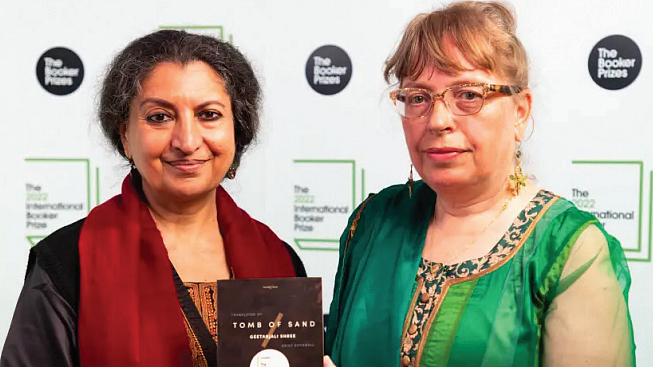Demand surges for Hindi titles and translations following international Booker Prize for 'Tomb of sand'
International Booker Prize 2022 for ‘Tomb of Sand’ has generated great interest in not only the prize winning title but also in other Hindi books and translations, say publishers, sellers and readers

The demand for ‘Ret Samadhi’ has sky-rocketed since the International Booker Prize was awarded to Geetanjali Shree, says Amod Maheshwari, CEO of Rajkamal Prakashan, the publisher.
“We had about 2,000 copies of the original printed and they have sold out. We are now in continuous production mode and 20,000 copies of the reprint are ready. We will continue to print copies since there is a huge demand,” says Maheshwari.
Indeed, the award has generated tremendous interest with regional booksellers reaching out for other popular titles like ‘Raag Durbari’ (2016) by Shrilal Shukla, ‘Maila Aanchal’ (2019) by Phanishwarnath Renu, ‘Rashmirathi’ by Ramdhari Singh Dinkar which won a Jnanpith Award way back in 1972 among others along with all of Geetanjali Shree’s other books, he informs.
“Before Covid struck, we used to bring out 300 new Hindi books every year. This number has dropped slightly but is certain to pick up again. The Booker Prize marks a special milestone for literature in all Indian languages, including Hindi. Excellent writing in Hindi and other Indian languages is rapidly attracting the attention of a global audience,” he adds.
‘Tomb of Sand’ appears to have generated great interest among women readers too, both young and old. Malavika Ajikumar, who is still reading the book, concedes that the book is especially comforting to women, that the anti-patriarchal novel revealing itself lightly like ‘a sweeping sand filled with water’.
“I found Tomb of Sand to be extremely experimental, which is weirdly fantastic. It is so clean in its language, especially the translation. Readers around the world are reading it because it was long-listed for the International Booker Prize, got shortlisted, and finally won it,” gushes Vivek Tejuja, book blogger, who has worked at Flipkart, Mumbai.
He claims to have read the book from “cover to cover” and believes it will encourage more writers to experiment. “I was ecstatic that the book exists in the world,” he exclaims.
Asked about the limited sale of books in India, Tejuja is philosophical. “There are people who read, and then there are people who don’t read. And then there are people who pretend to read,” he says with a shrug.
There is now another category of readers who have emerged during the last decade or so, with the advent of Instagram and Bookstagram, Quito and Book Twitter. There is the pressure of the social media because so many people want to be seen and recognised as readers. It sort of adds that ultimate intellectual touch to your profile, Tejuja says with a laugh.
“You now see books on Instagram and social media. Those are the books that get talked about. Over the next two-three months, you will see that everyone is buying books and whether or not they’re reading, that’s a different matter,” is his parting shot.
But he also points out the publishing scene in Kerala, Bengal and Maharashtra and other regional literature, in which novels first get published in magazines and newspapers before getting printed as books.
In English and for translations, however, such avenues are either missing or limited.
(This was first published in National Herald on Sunday)
Follow us on: Facebook, Twitter, Google News, Instagram
Join our official telegram channel (@nationalherald) and stay updated with the latest headlines
